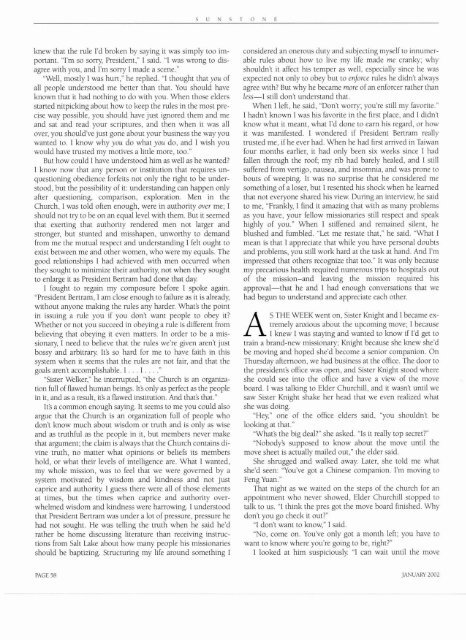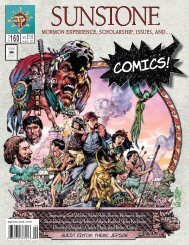Eugene England - Sunstone Magazine
Eugene England - Sunstone Magazine
Eugene England - Sunstone Magazine
You also want an ePaper? Increase the reach of your titles
YUMPU automatically turns print PDFs into web optimized ePapers that Google loves.
S U N S T O N E<br />
knew that the rule I'd broken by sayng it was simply too important.<br />
"I'm so sorry, President," I said. "I was wrong to disagree<br />
with you, and I'm sorry I made a scene."<br />
"Well, mostly I was hurt," he replied. "I thought that you of<br />
all people understood me better than that. You should have<br />
known that it had nothing to do with you. When those elders<br />
started nitpicking about how to keep the rules in the most precise<br />
way possible, you should have just ignored them and me<br />
and sat and read your scriptures, and then when it was all<br />
over, you should've just gone about your business the way you<br />
wanted to. I know why you do what you do, and I wish you<br />
would have trusted my motives a little more, too."<br />
But how could I have understood him as well as he wanted?<br />
I know now that any person or institution that requires unquestioning<br />
obedience forfeits not only the right to be understood,<br />
but the possibility of it: understanding can happen only<br />
after questioning, comparison, exploration. Men in the<br />
Church, I was told often enough, were in authority over me; I<br />
should not try to be on an equal level with them. But it seemed<br />
that exerting that authority rendered men not larger and<br />
stronger, but stunted and misshapen, unworthy to demand<br />
from me the mutual respect and understanding I felt ought to<br />
exist between me and other women, who were my equals. The<br />
good relationships I had achieved with men occurred when<br />
they sought to minimize their authority, not when they sought<br />
to enlarge it as President Bertram had done that day<br />
I fought to regain my composure before I spoke again.<br />
"President Bertram, I am close enough to failure as it is already,<br />
without anyone making the rules any harder. What's the point<br />
in issuing a rule you if you don't want people to obey it?<br />
Whether or not you succeed in obeyng a rule is different from<br />
believing that obeyng it even matters. In order to be a missionary,<br />
I need to believe that the rules we're p en aren't just<br />
bossy and arbitrary. It's so hard for me to have faith in this<br />
system when it seems that the rules are not fair, and that the<br />
goals aren't accomplishable. I . . . I . . . ."<br />
"Sister Welker," he intenupted, "the Church is an organization<br />
full of flawed human beings. It5 only as perfect as the people<br />
in it, and as a result, it's a flawed institution. And that's that."<br />
It's a common enough saymg. It seems to me you could also<br />
argue that the Church is an organization full of people who<br />
don't know much about wisdom or truth and is only as wise<br />
and as truthful as the people in it, but members never make<br />
that argument; the claim is always that the Church contains divine<br />
truth, no matter what opinions or beliefs its members<br />
hold, or what their levels of intelligence are. What I wanted,<br />
my whole mission, was to feel that we were governed by a<br />
system motivated by wisdom and kindness and not just<br />
caprice and authority I guess there were all of those elements<br />
at times, but the times when caprice and authority overwhelmed<br />
wisdom and kindness were harrowing. I understood<br />
that President Bertram was under a lot of pressure, pressure he<br />
had not sought. He was telling the truth when he said he'd<br />
rather be home discussing literature than receiving instructions<br />
from Salt Lake about how many people his missionaries<br />
should be baptizing. Structuring my life around something I<br />
considered an onerous duty and subjecting myself to innumerable<br />
rules about how to live my life made me cranky; why<br />
shouldn't it affect his temper as well, especially since he was<br />
expected not only to obey but to enforce rules he didn't always<br />
agree with? But why he became more of an enforcer rather than<br />
less-I still don't understand that.<br />
When I left, he said, "Don't worry; you're still my favorite."<br />
I hadn't known I was his favorite in the first place, and I didn't<br />
know what it meant, what I'd done to earn his regard, or how<br />
it was manifested. I wondered if President Bertram really<br />
trusted me, if he ever had. When he had first anived in Taiwan<br />
four months earlier, it had only been six weeks since I had<br />
fallen through the roof; my rib had barely healed, and I still<br />
suffered from vertigo, nausea, and insomnia, and was prone to<br />
bouts of weeping. It was no surprise that he considered me<br />
something of a loser, but I resented his shock when he learned<br />
that not everyone shared his view. During an interview, he said<br />
to me, "Frankly, I find it amazing that with as many problems<br />
as you have, your fellow missionaries still respect and speak<br />
highly of you." When I stiffened and remained silent, he<br />
blushed and fumbled. "Let me restate that," he said. "What I<br />
mean is that I appreciate that while you have personal doubts<br />
and problems, you still work hard at the task at hand. And I'm<br />
impressed that others recognize that too." It was only because<br />
my precarious health required numerous trips to hospitals out<br />
of the mission-and leaving the mission required his<br />
approval-that<br />
had begun to understand and appreciate each other.<br />
A<br />
S<br />
he and I had enough conversations that we<br />
THE WEEK went on, Sister Knight and I became extremely<br />
anxious about the upcoming move; I because<br />
I knew I was stayng and wanted to know if I'd get to<br />
train a brand-new missionary; Knight because she knew she'd<br />
be moving and hoped she'd become a senior companion. On<br />
Thursday afternoon, we had business at the office. The door to<br />
the president's office was open, and Sister Knight stood where<br />
she could see into the office and have a view of the move<br />
board. I was talking to Elder Churchill, and it wasn't until we<br />
saw Sister Knight shake her head that we even realized what<br />
she was doing.<br />
"Hey," one of the office elders said, "you shouldn't be<br />
looking at that."<br />
"What's the big deal?" she asked. "Is it really top secret?"<br />
"Nobody's supposed to know about the move until the<br />
move sheet is actually mailed out," the elder said.<br />
She shrugged and walked away. Later, she told me what<br />
she'd seen: "You've got a Chinese companion. I'm moving to<br />
Feng Yuan."<br />
That night as we waited on the steps of the church for an<br />
appointment who never showed, Elder Churchill stopped to<br />
talk to us. "I think the pres got the move board finished. Why<br />
don't you go check it out?"<br />
"I don't want to know," I said.<br />
"No, come on. You've only got a month left; you have to<br />
want to know where you're going to be, right?"<br />
I looked at him suspiciously "I can wait until the move<br />
PAGE 58 JANUARY 2002

















